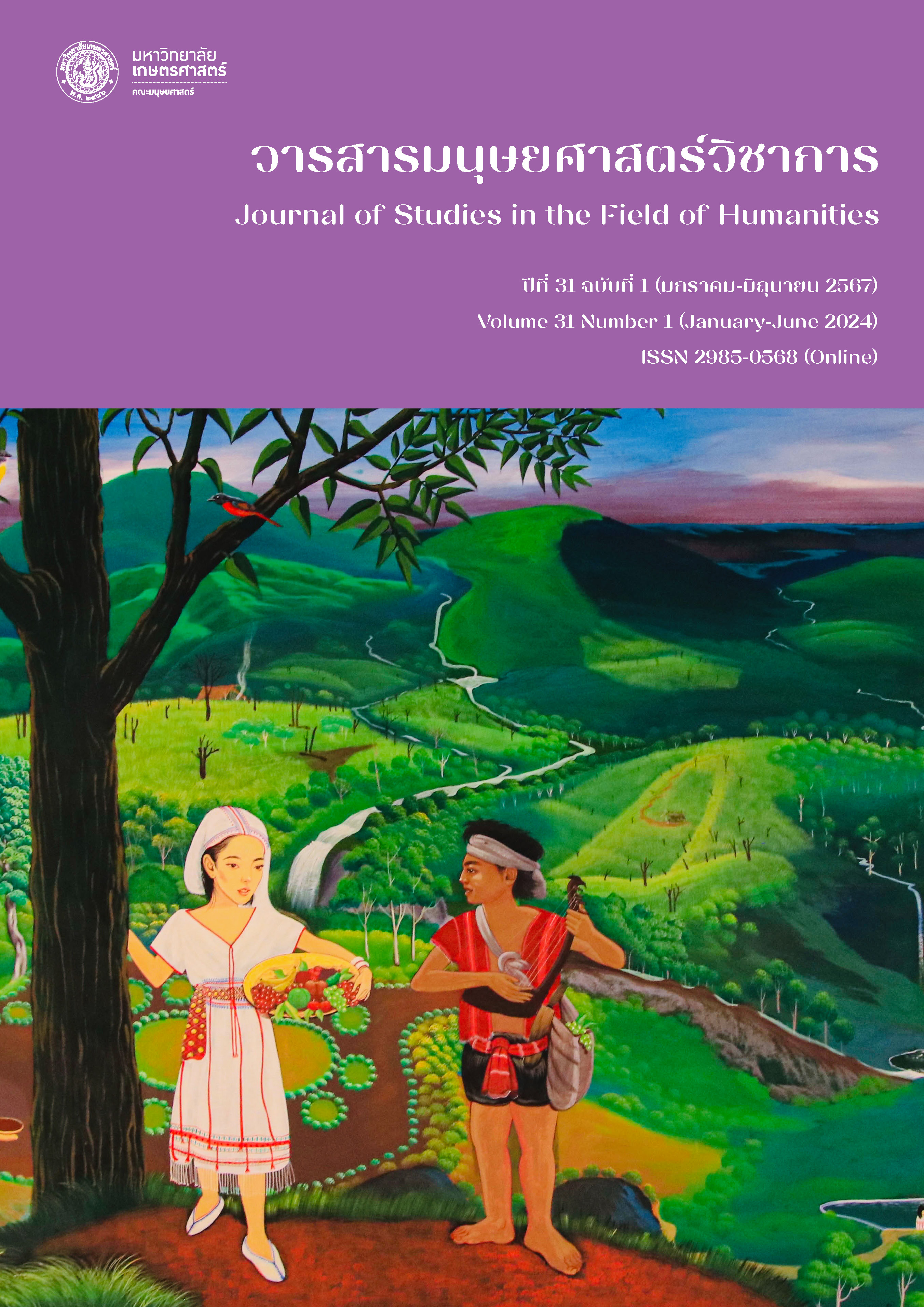สวนลับเรือนกระจก: การวิจารณ์เชิงนิเวศ
Main Article Content
บทคัดย่อ
บทความนี้เป็นการวิจารณ์เชิงนิเวศของภาพยนตร์เรื่องสวนลับเรือนกระจก เพื่อศึกษาการนำเสนอข้อคิดเกี่ยวกับผลกระทบจากการใช้ประโยชน์จากธรรมชาติและการสร้างความตระหนักด้านชีวจริยธรรม การศึกษาพบว่าภาพยนตร์สะท้อนให้เห็นความสัมพันธ์ของความก้าวหน้าทางเทคโนโลยี สิ่งแวดล้อมทางธรรมชาติ และสังคมมนุษย์ ผ่านเรื่องราวของปฏิสัมพันธ์ระหว่างมนุษย์กับธรรมชาติ คุณค่าของความเป็นมนุษย์ที่ถูกลดทอน และงานวิจัยทางเทคโนโลยีชีวภาพที่ซับซ้อนไม่สามารถคาดหวังผลที่แน่นอนได้ ผลการศึกษาสรุปได้ว่าภาพยนตร์เรื่องนี้สื่อความว่ามนุษย์ต้องหาสมดุลในการดำรงชีวิตในสังคมที่แก่งแย่งพลิกผันและต้องเตรียมตัวรับมือกับความท้าทายทางจริยธรรม
Article Details

This work is licensed under a Creative Commons Attribution-NonCommercial-NoDerivatives 4.0 International License.
References
ทนงศ์ จันทะมาตย์, และธัญญา สังขพันธานนท์. (2562). ภาพแทนของธรรมชาติกับสิ่งแวดล้อมและพลวัตของสำนึกเชิงนิเวศในนวนิยายไทยระหว่าง พ.ศ. 2475-2556. วารสารสันติศึกษาปริทรรศน์ มจร, 7(1), 213-223.
ยุพยง ทัศคร, และมารศรี สอทิพย์. (2561). สำนึกนิเวศลุ่มแม่น้ำโขงในนวนิยายสายน้ำและชายชรา: เรื่องเล่าจากคอนผีหลง. วารสารมนุษยศาสตร์สังคมศาสตร์ มหาวิทยาลัยขอนแก่น, 35(3), 90-113.
วิโรจน์ เจษฎาลักษณ์. (2553). ความสัมพันธ์ระหว่างความยุติธรรมด้านผลลัพธ์และด้านกระบวนการกับพฤติกรรมการเป็นสมาชิกที่ดีขององค์กร และผลการปฏิบัติงานตามบทบาทหน้าที่ผ่านการรับรู้การสนับสนุนจากองค์กร. วารสารมหาวิทยาลัยศิลปากร, 30(2), 65-81.
สาคร สมเสริฐ. (2556). ความแปลกแยกของมนุษย์ในสังคมสมัยใหม่. วารสารนักบริหาร, 33(3), 66-74.
อรวรรณ ฤทธิ์ศรีธร. (2562). ภาพแทนและการประกอบสร้างความจริงเรื่องธรรมชาติในนวนิยายแนวจินตนิมิตของไทย (วิทยานิพนธ์ดุษฎีบัณฑิต). มหาวิทยาลัยมหาสารคาม, มหาสารคาม.
Buell, L., Heise, U. K., & Thornber, K. (2011). Literature and environment. Annual Review of Environment and Resources, 36, 417-440.
Freud, S. (1933). New introductory lectures on psycho-analysis. In J. Strachey et al. (Trans.), The standard edition of the complete psychological works of Sigmund Freud (pp. 4667-4669). London: Hogarth Press.
Ivakhiv, A. (2008). Green film criticism and its futures. Interdisciplinary Studies in Literature and Environment, 15(1), 1-28.
Jung, S. (2019, February 19). Support for first-in-class drug development: South Korean government to invest 3 Trillion Won in biotech industry. Retrieved from http://www.businesskorea.co.kr/news/articleView.html?idxno=29244.
Kohzadi, H., & Azizmohammadi, F. (2014). Eco-Criticism’s hostility versus anthropocentrism’s hostility in literature. Anthropologist, 17(2), 655-667.
Marx, K. (2016). Economic and philosophic manuscripts of 1844. In W. Longofer, & D. Winchester (Eds.), Social Theory Re-Wired (2nd ed.) (pp. 152-158). Abingdon: Routledge.
Monast, J. J. (2018). Editing nature: Reconceptualizing biotechnology governance. Boston College Law Review, 59(7), 2377-2436.
Naess, A. (2008). Ecosophy T: Deep versus shallow ecology. Environmental Ethics: Readings in Theory and Application, 223-231.
Oppermann, S. (1999). Ecocriticism: Natural world in the literary viewfinder. Journal of Faculty of Letters, 16(2), 29-46.
Porter, A. (2017). Bioethics and transhumanism. Journal of Medicine and Philosophy, 42(3), 237-260.
Rolston, H. (2003). Value in nature and the nature of value. In A. Light, & H. Rolston (Eds.), Environmental ethics: An anthology (pp. 143-153). Massachusetts, USA: Blackwell Publishing.
Rosadiuk, J. A. (2018). A framework for an eco-philosophical hermeneutics of cinema (Doctoral dissertation). Concordia University, Montreal.
Sandifer, P. A., Sutton-Grier, A. E., & Ward, B. P. (2015). Exploring connections among nature, biodiversity, ecosystem services, and human health and well-being: Opportunities to enhance health and biodiversity conservation. Ecosystem Services, 12, 1-15.
Siuta, J., Domagała, Z., Pluta, D., Tokarski, M., Iwan, D., Jurek, T., & Dobosz, T. (2020). Body donation as the basis for advance in medicine in past and today-meaning, principles, controversies. In Ł. Biały, & I. Młynarczuk-Biały (Eds.), Advances in biomedical research-from COVID to medical humanities (pp. 187-198). Lublin, Poland: Wydawnictwo Naukowe TYGIEL.
Tillmann, S., Tobin, D., Avison, W., & Gilliland, J. (2018). Mental health benefits of interactions with nature in children and teenagers: A systematic review. Journal of Epidemiology and Community Health, 72(10), 958-966.
Wilson, E. O. (1993). Biophilia and the conservation ethic. In S. R. Kellert, & E. O. Wilson (Eds.), The Biophilia Hypothesis (pp. 31-41). Washington: Island press.
Yoon, J., Cho, S. K., & Jung, K. W. (2010). The challenges of governing biotechnology in Korea. East Asian Science, Technology and Society: An International Journal, 4, 335-348.
Zovko, J. (2019). What is so specific about moral judgment in bioethics?. Bioethics Update, 5, 25-33.

